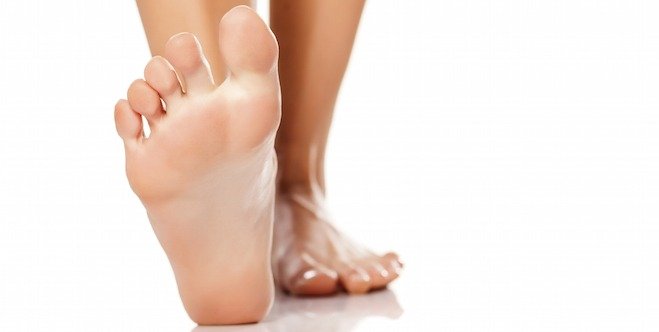
Proper foot care is important for everybody, but especially for people with diabetes. That’s because your feet can suffer if your diabetes is not well-controlled.
Why do people with diabetes have a higher amount of foot issues?
There are two main reasons that can lead to an increase in foot issues for those living with diabetes. Peripheral neuropathy (nerve damage), caused by continually high blood sugar levels, can result in a loss of sensation in the feet making it difficult for individuals to feel pain, heat or injuries. Poor circulation, also known as peripheral artery disease, can decrease blood flow to the extremities. As a result, the healing process is slowed making the feet more susceptible to infections.
What are some common foot care complications?
Calluses are areas of skin that become thick and hard from rubbing or pressure. Calluses occur more often and build up faster on the feet of people with diabetes.
Foot ulcers are breaks in the skin or sores that occur most often on the ball of the foot or on the bottom of the big toe. Foot ulcers are a leading cause of hospital admissions for people with diabetes.
What type of symptoms of neuropathy can occur in your legs and feet?
- Sharp, shooting pains
- A burning or tingling feeling
- A feeling of being pricked with pins
- Throbbing
- Numbness (not able to feel pain, heat, or cold)
What are the consequences of neglecting foot care?
- Poorly managed foot ulcers can lead to deep infections, including cellulitis, abscesses and bone infections (osteomyelitis). These conditions can be challenging to treat and often require aggressive medical intervention.
- Diabetes is one of the leading causes of lower-limb amputations globally. Most amputations are preceded by foot ulcers or infections that could not be adequately controlled.
- Foot problems can significantly impact mobility, independence and overall quality of life. They also place a considerable amount of emotional and financial burden on individuals and their families.
How can you avoid foot complications?
Here are some tips to ensure that you are living healthily with diabetes, and to avoid any foot complications:
- Practice proper foot care. Maintain good foot care by washing and moisturizing your feet daily. Be sure to dry your feet thoroughly, particularly between the toes, to reduce the risk of fungal infections. Avoid applying moisturizer between the toes, as excess moisture in this area can contribute to infections.
- Check your feet daily. Look for cuts, blisters, redness, swelling or nail problems. Use a mirror to inspect hard-to-see areas or ask for assistance.
- Use proper footwear. Wear comfortable, well-fitting shoes and avoid walking barefoot.
- Schedule regular visits with a podiatrist. They will address any foot issues early. Having your nails trimmed professionally is also beneficial, and calluses and corns can be managed appropriately.
- One of the most important things you can do to prevent neuropathy – and other foot complications – is to ensure that your blood sugar levels are at target. Diabetes Canada clinical practice guidelines recommend that people should have a before-meal blood glucose level of 4.0 mmol/L to 7.0 mmol/L and a blood glucose level of between 5.0 mmol/L and 10.0 mmol/L two hours after the start of eating.
- Take all your diabetes medications, as prescribed by your healthcare team.
- Maintaining a healthy body weight is also very important. Eating a healthy diet helps prevent diabetes complications, including foot problems and nerve damage. For more information about healthy eating, click here.
- Physical activity also helps you to live healthily with diabetes and prevent complications. For more information about physical activity, click here.
- One of the biggest threats to the health of your feet is smoking. Smoking affects small blood vessels. It can cause decreased blood flow to the feet and make wounds heal slowly. In fact, a lot of people with diabetes who need amputations are smokers. If you are smoker, try to quit.
Footcare is a cornerstone of diabetes management and can mean the difference between maintaining mobility and independence or facing severe complications like infections and amputations. A healthy lifestyle and adopting daily foot care practices can help you ensure that you do not develop foot complications. Check your feet every day, and see your healthcare team right away if you suspect or notice any problems with your feet.



